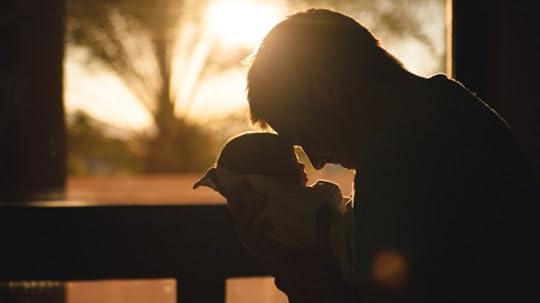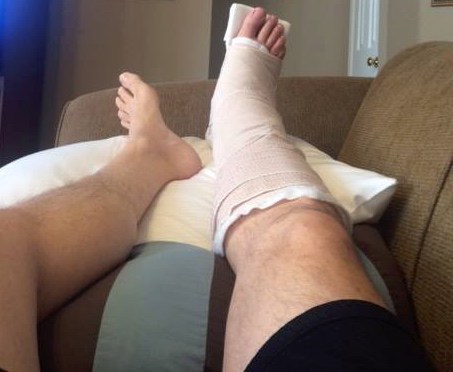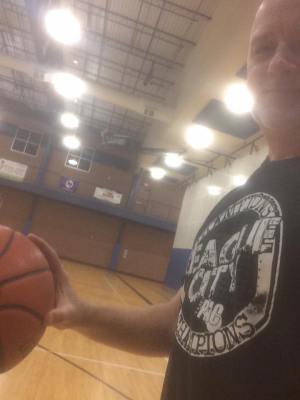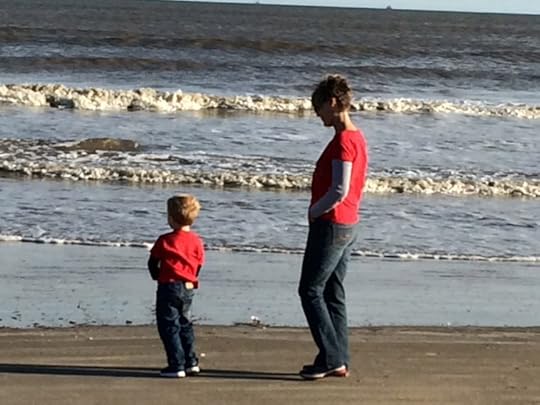Kenneth A. Camp's Blog, page 16
May 24, 2016
5 Signs My Son Is Developing A Healthy Attachment
We are created for attachment. By attachment, What I mean by attachment is a healthy relationship with other people. Sadly, many of us aren’t very good at it. If this is new to you, read this blog post—What Is Your Attachment Dance?

I often notice the interaction between a child and his or her parents. I smile when I see a child confidently interact with his or her environment. I know that a lot of that has to do with how much that child trusts his or her attachment parent.
Then I also notice when a child feels insecure.
The reality is that every child that comes from a hard place comes to us with an insecure attachment style. No way around that fact.
The good news is that it doesn’t have to stay that way! Even as an adult, we can earn a secure attachment style.
A couple of years ago, my son’s attachment to Danielle and I was no doubt insecure. It still is in many ways; however, I am seeing positive signs that he is developing a more secure attachment.
Here are 5 positive signs I notice:
He comes to me when he is hurt. You might think why wouldn’t a child run to his mom or dad when they get hurt, especially when they are young. But for a long time our son would run the other way or push us away if we tried to comfort him. Now he cries for us when he is hurt. He holds his arms open for me to pick him up, and when I do, he wraps himself around me.
He is okay when I or Danielle are not at home at bedtime. My son struggled with needing to know that we were both there for him . I have learned that if we were not around, he thought that we were gone for good. A common response of a child who suffered abandonment. The other night Danielle told him as he got ready for bed that she was going to the grocery store. He replied, “Okay Mommy. See you in the morning!”
He is able to spend right amounts of time playing alone. Similar to the previous sign, my son never wanted to be alone. He rarely played alone. In fact he had to be with us all the time. It wouldn’t be good for him to never want us around, but to never be able to play alone for a little while isn’t good either.
He looks into my eyes. Not always mind you. But he used to never look into my eyes. Now he will for a few seconds before looking away. Looking into another person’s eyes for any person, any age, requires an amount of trust and lack of fear.
He wants to make things right between us. We get a lot of practice making things right around our house. I overreact. He yells, hits, and throws tantrums. I speak to forcefully and get too rough with him. Recently we had one of these intense moments. Within a few seconds my son was standing next to me as I sat in his rocker. His hands rubbed my arm, and in a gentle voice he said to me, “Daddy, if you can apologize to me, I can apologize to you so we can be right again.” Yeah, who in their right mind won’t make it right with that?
I know that we have a long way to go still, but what I am seeing now gives me hope. How well our son learns to securely attach to us will decide how well he does later in life with his significant relationships.
My word of encouragement to you if you have a child from a hard place, please don’t give up. Trust that you can help your child develop a secure and healthy attachment. He or she needs you to keep doing the hard work of helping them heal now so that they know how to love and trust others well later in life.
May 17, 2016
8 Months After Surgery to Repair a Ruptured Tendon
I'm Playing Basketball Again!
The surgeons wouldn’t make any promises. One asked me if I enjoyed golf. The one who performed the surgery told me on the day of the surgery that once inside my ankle, he might just stitch me back up if it looked irreparable.

If you don’t know any of this story, I will catch you up to speed. At the beginning of 2015, my foot and ankle bothered me every time I played basketball. I mean it hurt!
I chalked it up to old age. So I rested. But, each time I went back on the court, if I planted my right foot a certain way, sharp pain shot across the top of my foot and ankle. I had the foot x-rayed to see if I had a stress fracture. “Nope”, said the doctor. “You probably have gout.”
I rolled my eyes. I might have gout, but this wasn’t gout!
So I rested some more. I returned to playing in May only to hurt it worse, but I still didn’t know what was wrong.
Willing to try anything, I went to see a sports chiropractor that works with runners. His response that only an MRI would tell us for sure, but that insurance probably want us to try a conservative route first. He worked on my foot, ankle, and shin a couple of times each week relieving the pain enough that I returned to the court after a month or so.
But I could tell that something was not right, so we got approval for an MRI. It was August now. The day after the MRI, I got a call from the referring doctor. The diagnosis? A neglected, ruptured anterior tibilias tendon.
Well yeah it was neglected! I think I ruptured it in May!!
I did what all intelligent, digital savvy people do now. I googled the injury. Yeah, well, anyway.
I did have a choice. No surgery and deal with ankle problems the rest of my life. Or, have the surgery ASAP with no promises.
Initially it was a no-brainer for me. Have the surgery for at least the chance of repairing the tendon even if I never did play basketball again. Which I didn’t expect I ever would again. But I at least wanted to be able to chase my young son around!
Still as the day of surgery approached, I wavered allowing small thoughts of fear enter my psyche. But on toward surgery day I pressed.
The surgery took maybe 1 hour. The surgeon met my wife, parents and a good friend in the waiting room with a huge smile exclaiming that it went better than he could imagine. He sat down next to Danielle asking if she wanted to see pictures on his smart phone. (I resisted the urge to insert those here)
From that day on my ankle responded quicker than projections. Overall everyone with medical or injury experience told me not to expect any kind of physical activity like running, much less, attempting basketball for about 12 months.
Everyone except my Physical Therapist. She and the technician asked me if I wanted to play basketball again.
I am sure my response was delayed by disbelief of what I heard them ask. YES! Even if it was to only shoot baskets on the driveway one day with my son.
 Then at the end of March, six months after surgery, I began going to the gym where I had played pick up basketball for several years. I could have gone anytime of the day, but I chose to go early in the morning when I knew my basketball buddies would be there. I wanted the motivation. I missed the interaction.
Then at the end of March, six months after surgery, I began going to the gym where I had played pick up basketball for several years. I could have gone anytime of the day, but I chose to go early in the morning when I knew my basketball buddies would be there. I wanted the motivation. I missed the interaction.
The first several times I went I worked out by myself on agility and strengthening drills assigned by my PT. I would shoot some baskets, and get caught up with my friends. Then one morning after working out for about an hour on an empty court, I heard the guys asking if enough were staying to play one more game. I poked my head around a curtain to hear one say, “Hey there is number 10!”
I felt good, and I decided to give it a shot. There I was playing in a pick up basketball game less than 8 months after my surgery! I have played a few more times since then, too. Don’t worry, I am pacing myself trying not to over do it.
I know that one day I will have to hang up my basketball shoes forever, but for now I feel blessed to still be able to play!
May 10, 2016
Why I Am Launching a Podcast

I admit, I have tried to take on too much the past several months. From ankle surgery in September to buying a new home in December and moving in January, to getting our former house ready to rent, to joining a new nonprofit board also in January, no wonder I feel overwhelmed.

Just around the new house I constantly have about five projects going at the same time.
To keep in line with all that, I decided last fall to update my website which I thought I would have released by January. Yeah. Not quite. But I am still working on it along with the following:
Finishing an e-book series about Foster Care and Adoption
Upgrading my content and delivery method to email subscribers
Continuing my weekly blogging
And…launching a podcast
None of those include writing projects I have on the back burner.
Did I include launching a podcast on that list?
Are you wondering why am I launching a podcast now? Good question. First of all, I am still about 2 months away from giving you a hard launch date, but I have already begun recording some episodes.
The main reason for launching a podcast? To deliver valuable and accessible content to you.
How will a podcast provide valuable content?
You can listen. I really appreciate all who have loyally read my blog posts over the past couple of years, especially when you share those posts with your friends. Don’t worry, I will keep posting blog articles! But with an audio podcast, you don’t have to stop everything you are doing to read it. You can listen while you drive, work out, even do chores around the house.
Here are a couple of benefits to listening to a podcast over reading a blog post:
I can go in more depth. Most people won’t read much more than 800 words in a blog post, but you can easily listen to an hour-long podcast. That allows me to expound on the content. In fact, that’s exactly what some of my episodes will be—an in-depth version of an earlier blog post.
Interviews. I have tried interviews both in text and video form. I enjoy doing them. I learn from others, so I know you do too. I have interviewed authors, missionaries, foster parents, and more. Again, because you have more time to listen to an audio podcast over a text blog post or even to watch a video, you get more invaluable information along with hearing the heart and emotion coming through the person’s voice. Priceless!
I also benefit (you do too by these reasons why I am launching a podcast)!
Strengthen my relationship with my current audience. When I can listen to someone’s voice, I feel that I know them better. I hear emotion, accent, personality. It’s like they are sitting across the table from me. One thing I have learned about blogging is to picture who is reading what I write. An audio podcast makes that a little more personal.
Broaden my audience. For reasons already mentioned, I expect to reach a different audience. Many people will listen to a podcast that will never read a blog post.
Improve my speaking skills. Just as blogging has improved my writing skills, I know podcasting will improve my speaking skills. Really what I seek to improve is communication. Ideas, hope, encouragement are all things I hope will happen as I seek to help you not only discover your mission in life but also help you live it.
What are some reasons you listen to podcasts (if you do)? Also, what kind of podcasts would you like to hear from me?
May 5, 2016
Enjoying the Sound Of “Momma” In My Home

For 23 years Mother’s Day around our house was bittersweet. In many ways we felt stuck in the role of children wishing our well-deserving moms a happy Mother’s Day. It was like we never had made the transition into adulthood ourselves of ever feeling the joy and anguish of having our own children.

We watched the second Sunday of May approach us each year with a sense of dread. Should we even attend church this year? All it does is stir the feelings of loss and defectiveness.
All that may sound melodramatic to you, but it doesn’t to anyone who has struggled with infertility or suffered the loss of an only child.
As I reached my late 40s I became resolved that I would never hear the words of child calling for his or her mother in my home, my family. But my wife, Danielle, still longed for a child of her own. And God listened to the desires of her heart.
Our son is now five-years-old. He is extremely verbal, vocal, and expressive. He wakes up talking or screaming or, like this morning, singing. Sometimes his incessant chatter drives me, a mostly quiet, introspective person, batty. Other times he makes me laugh.
But brings great joy to my heart and soul is hearing him call out to his mother. “Momma!” he calls with a sound in his voice reserved only for that word. It is a sound of endearment, need, longing, and love.
I am sure for a time my wife wondered if she would ever hear those words spoken in that way from our son. As do many adopted children, he struggled with attaching to Danielle. Many days ended with her crying herself to sleep because it didn’t really feel like she was his Momma.
But then something shifted in him. He finally felt safe enough to allow his heart to trust her. He seemed to understand that she was not going to reject him or abandon him.
And because of that, I love hearing my son say, “Momma!”
So as we approach Mother’s Day, because I know from personal experience that this day can be one of the toughest of the year, my heart is full of gratitude for the blessing of our son in our family. I am thankful for a wife who pours every ounce of herself into being a Mom.
Happy Mother’s Day Danielle! You are an amazing mother!
May 3, 2016
5 Reasons To Give More Away

Last year Mark Zuckerberg, found of Facebook, pledged in honor of his newborn baby to give away 99% of his Facebook shares to charity. America is blessed throughout its history with stories of wealthy people giving away large portions of their wealth and resources.

But what about the average person? Can we give away more? Granted, when you’re worth millions and even billions, it seems easier to give away more. Yes, they have more to give away, but it doesn’t make it easier.
If you make $10,000 per year and spend $11,000, you are broke. And if you make 1 million per year and spend 1 million one thousand, well, you’re broke too. It’s all in how you handle your money and resources. And how you handle your money reflects where your heart is, whether you have $10 or $10 million in your bank account.
Here is a paradox. If you want to get your finances under control, and your heart right, give more away. Begin with a small amount, but don’t wait until you are out of debt to give to others.
Even if you are in great financial shape and already give to some worthy causes, I know you can give more away.
Here are 5 reasons to give away more:
You have more than you need. If you live in America, almost all of us have more than we need. Our consumeristic culture convinces us that we need to keep accumulating more and more stuff; that we need the latest technology, the most recent clothing, the newest car. No. No we don’t. Nothing wrong with owning nice things, but they will encumber more than please you after awhile.
You were given extra for a reason. If you have extra, there is a reason. And it’s not so that you can store it away for safe keeping. You are meant to use, invest, and bless others with. Responsibility comes with abundance.
Not much will fulfill you more. What brings more fulfillment, joy, and satisfaction—organizing your collection of whatever your obsession is for the 100th time or witnessing how you gave a person a hand up, some hope, or even joy because of your generosity?
You can’t take it with you. Money, gold, possessions all will stay here on this earth when you leave. What good will it do if you keep it all to yourself until you die? If fact, by doing so, you may cause more grief for others. And why not benefit from seeing the good done by your generosity while you can?
Kingdom investment. I believe that our time on this earth is not all that there is to life. I believe that it is really a shadow of what is eternal. How you use your resources while on this earth can and will have an eternal impact. Personally when I am considering investments, I keep this principle in mind. I have bypassed an earthly, tangible investment for one that invests in the eternal Kingdom. I believe that reaps a return both now and forever.
The question I have is why exactly are you hanging on to more than you need? Will you take a moment to explore what is keeping you from giving away more?
April 26, 2016
Dear Foster Parent, They Are Not Your Enemy
3 Ways to Work with the Biological Family

When a child is placed into a foster home, most foster parents go into Papa and Mama Bear mode. A sense to protect this child from any more harm overrides every emotion that creates an “us against the world” approach.

When CPS placed an eight-month-old boy with us, I listened to the case worker explain in general why CPS removed him from his biological family. Even though I didn’t get a lot of detail, I received enough that I did go into major protection mode.
No one was going to hurt this child again.
Two days after CPS placed our son with us, he had his first parent visit. Naively, I didn’t think we would meet the parents, then or ever. Honestly, I didn’t want to meet them.
To me, they were the enemy.
We did meet the parents. Couldn’t avoid it even if we tried. They saw us walking up with their son, and with huge smiles on their faces they reached out to take their son from my arms.
I wondered, “This is who allegedly hurt this child?”. Even though I stood there uncomfortable to actually talk with this child’s parents, I felt conflicted. They were mere children themselves. They could be my children!
Intellectually I understood that CPS had a goal of reconciling the family, at least someone in the family, with this child. Yet, with this precious baby boy in my life, my home, under my protection, I struggled with reconciling that in my heart.
So, over the next few weeks, I not only met the parents, but the paternal grandmother and step grandfather, an uncle and aunt, and the maternal grandfather.
Even though my heart attached more each day to this little boy, I also felt a shift in my spirit toward his biological family. Yes, someone in the family injured this child. But, they were his family, not his nor my enemy.
If reconciliation was going to happen, I needed to change how I thought and interacted with this family.
I have a challenge for anyone who fosters or is considering foster care:
Work Toward Complete Healing for the Entire Family
Here are three ways to view your interaction with the biological family that will help you work toward this goal of healing for the entire family.
Don’t view the relationship as “us vs them”. Again I see this a lot with foster parents. It often extends beyond the family to include CPS caseworkers, lawyers, and everyone involved in the case. A foster family can especially act this way if they are adoption motivated. That is why it is so important to check your motivations for fostering. If adoption is a major motivation, then you are less likely to want the success of the reconciliation of the family. You in fact may work against it.
Get to know as many family members as possible. I really did think that I could foster this little guy without interaction with any of his biological family. However I ended up talking to them fairly regularly at parent visits, family meetings, and court hearings. The relationship never went beyond that, but I think that is because I didn’t encourage it. Still, I hope, and I do think, they saw me and Danielle as someone who wanted to care for their child.
See yourself as a possible mentor and advocate. Now this may stretch you a bit. It also might make your CPS case worker a little uneasy. I think typically they prefer less interaction between the foster and biological family than more. But I have seen a slight shift in this when the foster family gains a positive reputation among CPS, lawyers, and the judge. I heard of one judge that instructed the biological parents to meet with the foster parents for mentoring.
When we, as foster parents, extend our view and our compassion beyond the child to include the entire family, we will see more families heal. I really do believe, even though we were adoption motivated, that the very best place for any child is with their biological family, when that family is healthy as possible and able to care for that child.
Are you willing to embrace that view and not see the biological family as your enemy but rather someone who needs you?
April 19, 2016
The Secret to a Close-Knit Community of Believers

One thing I notice about church in this generation is that it’s really easy to show up on Sunday, hang out for a couple of hours, then leave without really knowing anyone any more than when you got there. You could really not even talk to anyone.

I guess that’s fine for those who want their “church life” to stay in its place—at church.
But what if you and I seek a close-knit community of fellow believers; a community that knows each other beyond the names of spouses and children. A community that knows what each others dreams, passions, fears, and struggles look like.
Many churches make valiant attempts to foster this kind of community with small groups, Bible studies, retreats, one-on-one mentoring, and short-term mission trips. Yet even when this is done well, most of us still tend to view that as our “church” community or friends.
But what about a community that goes beyond knowing each other? A community that fights for the same cause. A community of believers who understand that they have a common mission; that each person possesses gifts for the purpose of accomplishing that mission.
What is the secret to that kind of community of believers?
Having a common cause helps, but there is something different that melds a community together that resembles a covenant relationship; one that will stick together through anything.
What I think does this might surprise you.
Suffering. Persecution.
Come and suffer with us. Join our church, and you will face persecution. We will train disciples to live a life of sacrifice. We send our people into the toughest, most dangerous places to share about the love of Christ!
Probably not a good marketing strategy to get people to attend your church.
Here is the disconnect:
Today we call people to an experience that will entertain, comfort, and take care of you and your family. Churches are interested in numbers, so the last thing they will do is tell you that if you join them you will face suffering and persecution.
Bleh.
And, so, our relationships end up “Bleh”. As long as we can agree, get along, and not challenge each other too much, we can have “community”.
What if a church called us to be a disciple of Christ that is willing to sacrifice, suffer, even face persecution? A community of believers that read God’s Word, pondered it, then lived it; instead of, meeting each week trying to remember what they read and discussed the week before.
That life of a community of disciples would not meet simply because they enjoyed and knew each other—They Would Need Each Other.
When Danielle and I lived in Thailand, we lived in a city of about 250,000. I estimate that less than 2000 were Christians in the city. Not only were most people in the city Buddhist, many lived a pagan lifestyle. The sex trade dominates the city.
When we met, the believers, we needed each other. I have nothing to compare to the depth of relationship I developed with a few believers in a six-month timeframe in that setting. The difference?
Suffering and persecution.
We didn’t fear for our lives, but we did not live in a friendly environment.
I have many good friends here where I live now, but honestly, I long for that close, intimate bond that comes when we pursue His mission together facing whatever comes our way.
I haven’t found anything else on earth like that. Have you?
April 12, 2016
Is Your Need to Fit In Keeping You from Living a Life on Mission?

Most people want to fit in. Most are trend followers, not trend setters. We wear the same clothes, drive similar looking vehicles, even style our hair the same ways…well those who have hair.

Throughout my life I have tried to fit in. I always have. I am also an introvert. I don’t care for attention. I often deflect the attention to the extroverts around me, and I am more than okay with that.
But the more I pursue God’s mission in my life, I find that I “fit in” less and less.
From my experience, if you live out God’s mission for your life—You will be different!
The question is will “not fitting in” keep you from living a life on mission?
Will you consider using your wealth for His purpose and not your own? Would you become a one salary household so one of you can stay at home with young foster children? What about spending your vacation serving others in a poverty-stricken community instead of someone serving you in an upscale resort.
Any time a person decides to embrace their mission, they remove themselves from the masses. And people take notice.
For example, this summer, millions of people will tune into the summer olympics to watch thousands of world-class athletes compete. We will hear story after story about the sacrifices these athletes made so they could pursue their dream.
These athletes discovered their mission and pursued it. For some that meant not attending school like theirs peers. For others it meant delaying financial gain.
For all it definitely meant that they were different from their peers.
Think about the people we remember throughout history. Aren’t they the ones who stood out from the crowd? I propose that’s because they understood, at least at some level, their mission, and pursued it even though many times they didn’t fit in.
You too probably will be different if you embrace God’s mission for your life. But you are meant to be different!
God doesn’t crank us out like a cookie cutter to look and act the same. Haven’t you heard the saying, “When God made you He threw away the mold?” There is truth to that statement. He gifts each of us with different talents, abilities, and interests for a reason.
Yet we spend a lifetime of attempting to look and act like someone else. Sadly that rarely fulfills.
Also, when we resist the mission that God has for us because we would rather not stand out from the crowd, someone somewhere suffers because of it. God’s mission always involves you meeting another person’s needs.
So what will it be? Will you resist the temptation to fit in and live the mission God has for you?
April 5, 2016
Why People Who Need Help Tend to Isolate

Matt and I sat at her table discussing ways our nonprofit organization could help her with repairs around her home. She lived in an older manufactured home that sat on several acres on the outskirts of town. She had some family, but they were busy with their own lives.

She asked how many people would come to help. Matt joyfully responded that he felt sure he could have around 30 volunteers come help. With that bit of information, she froze. After a moment of awkward silence she informed us that this wasn’t going to work.
Matt did eventually work at her home with a small number of volunteers. A number she felt comfortable having on her property.
Why won’t they ask for help…
She was a young single mother with two small children. She knew it wasn’t right, but she didn’t know any other thing to do. She left her children at home for hours at a time while she went out to work odd jobs, or make a trip to the store. Sometimes she just needed a break, so she would go hang out with some friends…again leaving her children alone at home.
Then the inevitable happened. A neighbor found her three-year-old wandering around outside her apartment wearing only a soiled diaper. Another resident of the apartment picked the baby up and began looking for her parent. Finally she called 911 to get help. This opened up a Child Protective Services investigation which led to them removing the children from the home and placing them in foster care.
People isolate and resist the very help they need…
Stories like these happen all the time. What is the common thread? One is social isolation. Often we who “have it all together” look at people who struggle with a contemptuous attitude not understanding some of the causes that led to isolation, and in many cases, poor choices.
In my time around people I have seen different reasons people isolate. Some are logistical. Some are relational. Some are emotional.
Why People Who Need Help Isolate
Because of their geography. Some, like the woman in the first story, are isolated by where they live. My grandmother lived on 3 acres a mile outside of a little town of about five thousand people. Her closest relatives lived an hour away. She could go days without a personal visit.
Because of lack of transportation. Geography might not isolate a person, but if they don’t have a reliable form of transportation, then isolation exists. Lack of transportation affects a person’s ability to attend school, hold a job, and take part in their community.
Because of economic challenges. If you don’t have money to put gas in your car, go get a bite to eat, or enjoy local entertainment, then you just stay home. Nothing wrong with that, but when it’s day after day, loneliness, depression, and isolation sets in.
Because of fear. If a person isolates themselves for long periods of time, then they struggle with fear and social anxiety. Even if they want to ask, they can’t overcome the emotional barriers.
Because of shame. Shame is a powerful emotion. We get ashamed of our lifestyle, our poverty, our family dynamics, our failure…shame keeps people from asking for help maybe more than anything else.
The point is…
The people who need our help the most probably aren’t going to knock on our doors or give us a call. And if we are so busy with our own lives, we will not notice them. It takes a sensitive and intentional person to first notice a person in need, then to step out of our comfort zone to offer them help.
Want to live a missional life? Ask God, who notices everyone, to open your eyes to those around you who are isolating.
March 29, 2016
7 Things Your Foster or Adopted Child Needs to Hear from You
Really Any Child Needs to Hear!

Words we say. Words we don’t say. Both are powerful. Lately I am learning the hard way. I have said some things to a loved one that hurt deeply. I am also guilty at times of not saying something when it’s needed.

I think our society is losing it’s ability to talk to each other in ways that edify. I’m not sure what the cause is or what that reflects, but I don’t think it’s a good thing.
We don’t understand the power that is found in our tongue; our words.
A tiny spark can set a great forest on fire. And among all the parts of the body, the tongue is a flame of fire. It is a whole world of wickedness, corrupting your entire body. It can set your whole life on fire, for it is set on fire by hell itself.James 3:5b-6 NLT
James has a lot more to say about the powerful nature of our tongue. Our tongue can build up or it can destroy.
Whether a foster or adopted child is a few hours old or in their teens when placed in our home, they need the transforming power of edifying words spoken into their lives.
Unless you are an overly positive person (or amazingly controlled by the Holy Spirit), you need to be intentional about speaking these words of affirmation, encouragement, healing, and hope.
7 Things Your Foster or Adopted Child Needs to Hear from You:
You are safe. Trauma puts a child on high alert. Many times we label them as hyper-active when they are hyper-vigilant. They can’t let their guard down. They are constantly observing their environment looking for danger. They can never hear too much from us that they are now safe.
You can act your age. Especially children who have spent some years in foster or institutional care have lost their ability to just play. They probably had to make too many decisions, take care of younger siblings, or again, protect themselves. This robs them of their childhood. They need to gently hear over and over that it’s ok to be a child.
Yes. I far too often default to “no”. Sometimes it’s, “no, No, NO!” I consciously look for opportunities to say yes. Many times I stop myself when about to say no and ask myself if it’s possible at all to say yes.
You matter. The deepest wound is neglect. A child who that no one notices, rejects, or abandons struggles with self-worth.
I notice you. You are seen and heard. Of course we notice them when they misbehave. Often a child from a hard place misbehaves for many other reasons other than rebellion. What about when they act as we want them to act? Our children need random, unsolicited words of praise and delight.
You belong. Every child needs a sense of belonging. In my conversations with people who aged out of the foster care system, one of the most powerful sources of healing for them was knowing that they had a place of belonging. Even if a child is in our homes for a matter of days, we can speak this into their lives. We don’t need to withhold out of a fear of experiencing our own feeling of loss.
You are loved. Of course every child needs to know they are loved. A child from a hard place may pull away from touch, but you can always express proper words of affection. Yes, sometimes we need help in feeling affection for a difficult child. Yet, if we want to help that child heal…
What words that build up would you add to this list?



